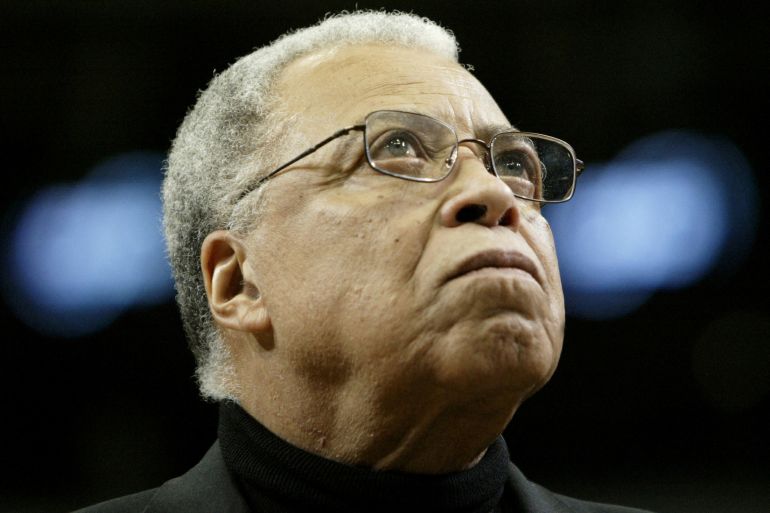James Earl Jones, actor and voice of Darth Vader, has died aged 93
Born in poverty in segregated Mississippi, Jones went on to become one of the world’s most celebrated actors on stage and screen.
James Earl Jones overcame a stutter to emerge as one of the world’s most recognisable voices [File: Reuters]Published On 10 Sep 202410 Sep 2024
Actor James Earl Jones, an imposing stage and screen presence whose commanding voice defined Star Wars villain Darth Vader, has died. He was 93.
Jones, who had had diabetes for many years, died on Monday at home, his agent Barry McPherson said. He was surrounded by family members.
The pioneering Jones, who in 1965 became one of the first African American actors in a continuing role on a daytime drama (As the World Turns) and worked well into his 80s, won two Emmys, a Golden Globe, two Tony Awards, a Grammy, the National Medal of Arts and the Kennedy Center Honors. He was also given an honorary Oscar and a special Tony for lifetime achievement. In 2022, a Broadway theatre was renamed in his honour.
Jones’s deep, commanding voice also defined his career. As well as being the voice of Darth Vader, he was King Mufasa in both the 1994 and 2019 versions of Disney’s The Lion King and could be heard announcing “This is CNN” to introduce the channel’s news shows.
Jones laughed when a BBC interviewer asked if he resented being so closely tied to Darth Vader, a role in which David Prowse did the on-screen work in costume.
“I love being part of that whole myth, of that whole cult,” he said, adding that he was glad to oblige fans who asked for a command recital of his “I am your father” line to Luke Skywalker, played by Mark Hamill.
“#RIP dad,” Hamill wrote on X on Monday with a broken heart emoji above a story about the death of Jones.
Jones was awarded an honorary Oscar for lifetime achievement in 2012 [Chris Carlson/AP Photo]
Lucasfilm, which produced Star Wars, said it was “deeply saddened” to learn of Jones’s death.
“The menacing baritone he brought to Darth Vader will forever be beloved by fans and regarded as one of the great villainous performances in cinema,” company president Kathleen Kennedy said in a statement. “His commanding presence on screen, and warm personality off screen will be greatly missed.”
Jones said he never made much money from the Darth Vader part – just $9,000 for the first film – and that he considered it merely a special effects job. He did not even ask to be in the credits of the first two Star Wars films.
‘A heartbreak’
Born by the light of an oil lamp in a shack in segregated Mississippi on January 17, 1931, Earl Jones’s father had already abandoned the family to pursue life as a boxer and, later, an actor. When the boy was six, his mother took him to live with her parents on their farm in Michigan.
“A world ended for me, the safe world of childhood,” Jones wrote in his autobiography. “The move from Mississippi to Michigan was supposed to be a glorious event. For me it was a heartbreak, and not long after, I began to stutter.”
Too embarrassed to speak, Jones remained virtually mute for years, communicating with teachers and fellow students with handwritten notes until a sympathetic teacher helped him recover his voice.
“I could not get enough of speaking, debating, orating — acting,” he recalled in his book.
Jones switched to drama in university after failing his medical exams, and after serving in the military, he moved in with his father in New York in the 1950s and joined the American Theater Wing programme for young actors. The two men waxed floors to support themselves while looking for acting jobs.
His breakthrough role on Broadway was The Great White Hope, playing a character based on Black heavyweight champion Jack Johnson. The play examined racism through the lens of the boxing world and critics raved about Jones’s performance.
A popular theatre draw for decades, he played leading roles in Shakespeare including Hamlet, Macbeth, King Lear and Othello.
His film career began in 1964 with Stanley Kubrick’s classic satire Dr Strangelove or: How I Learned to Stop Worrying and Love the Bomb.
Jones was a trailblazing Black actor, winning big roles in racially charged movies and plays that broke ground for Black actors who came after him.
Acclaimed movie roles included novelist Terence Mann in 1989’s Field of Dreams and South African Reverend Stephen Kumalo in 1995’s Cry, the Beloved Country. He also starred in Coming to America and The Hunt for Red October.
Jones’s first wife was Julienne Marie Hendricks, a co-star in Othello. Earl and his second wife, actress Cecilia Hart, who died in 2016, had one child, Flynn Earl Jones.
